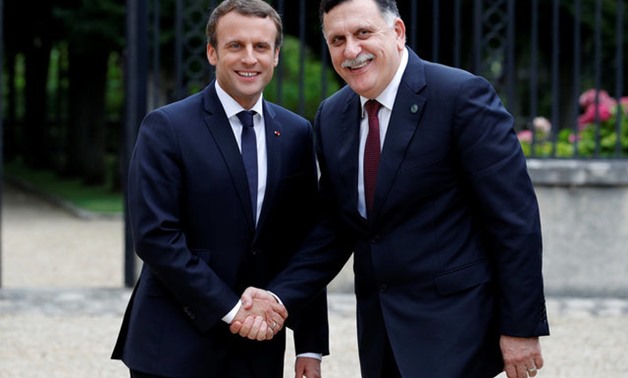
French President Emmanuel Macron (L) welcomes Libyan Prime Minister Fayez al-Sarraj for talks over a political deal to help end Libya’s crisis in La Celle-Saint-Cloud near Paris, France, July 25, 2017. REUTERS/Philippe Wojazer
CELLE-SAINT-CLOUD - 25 July 2017: The French presidency hopes Libya's Prime Minister Fayez al-Serraj and the divided country's eastern commander Khalifa Haftar will on Tuesday agree on a conditional ceasefire and to work towards elections, according to a draft statement it mistakenly sent.
The two men were due to meet President Emmanuel Macron in the afternoon, just outside Paris, in a second encounter between the rivals since talks in Abu Dhabi in May that produced little concrete progress.
"We commit to a ceasefire and to refrain from any use of armed force for any purpose that does not strictly constitute counter-terrorism," they said in the draft statement, which Macron's Elysee office later said was a working document that had been emailed prematurely.
Past attempts at peace deals in oil-producing Libya have often been scuttled by internal divisions among the myriad of competing armed groups that have emerged since rebels toppled strongman Muammar Gaddafi in 2011.
Serraj and Haftar are set to commit to working for elections as soon as possible from July 25 under U.N. supervision, the document added.
The draft statement was the result of negotiations between emissaries of the Libyan rivals and French officials but its content could still be subject to some changes, a source at the Elysee said.
The French initiative has angered officials in Italy, which has previously taken the lead in efforts to bring peace to its former North African colony and borne the brunt of successive waves of African migrants who have crossed the Mediterranean from Libya.
Italian Foreign Minister Angelino Alfano on Tuesday told La Stampa newspaper he supported the French initiative. But he added: "There are too many open questions on Libya, too many mediators, too many initiatives ... we need to combine our efforts and focus them on (U.N. envoy for Libya Ghassan) Salame."
Western governments are pushing a U.N.-backed political agreement to unify the country under which Serraj's Tripoli-based government was installed. One key sticking point has been the role Haftar could play and who would control Libya's army.
Haftar, who this month declared victory over rival armed groups in the battle for Libya's second city Benghazi, has refused to accept the government's legitimacy. He has been gaining ground backed by allies Egypt and United Arab Emirates.
Serraj is backed by Haftar's rivals, armed brigades in the western city of Misrata, and by some factions in Tripoli. But he has struggled to extend his government's influence and faces resistance from some hardliners in the capital.
"It is unclear if the summit will be anything more than a Kodak moment," said Mattia Toaldo, a Libya expert at the European Council on Foreign Relations, adding that both leaders's camps were very divided.
"Serraj did not receive a mandate to negotiate from his backers in Tripoli and Misrata so anything that could be spun by Haftar in terms similar to what happened in Abu Dhabi would be highly destabilising for Serraj now as it was then."

Comments
Leave a Comment